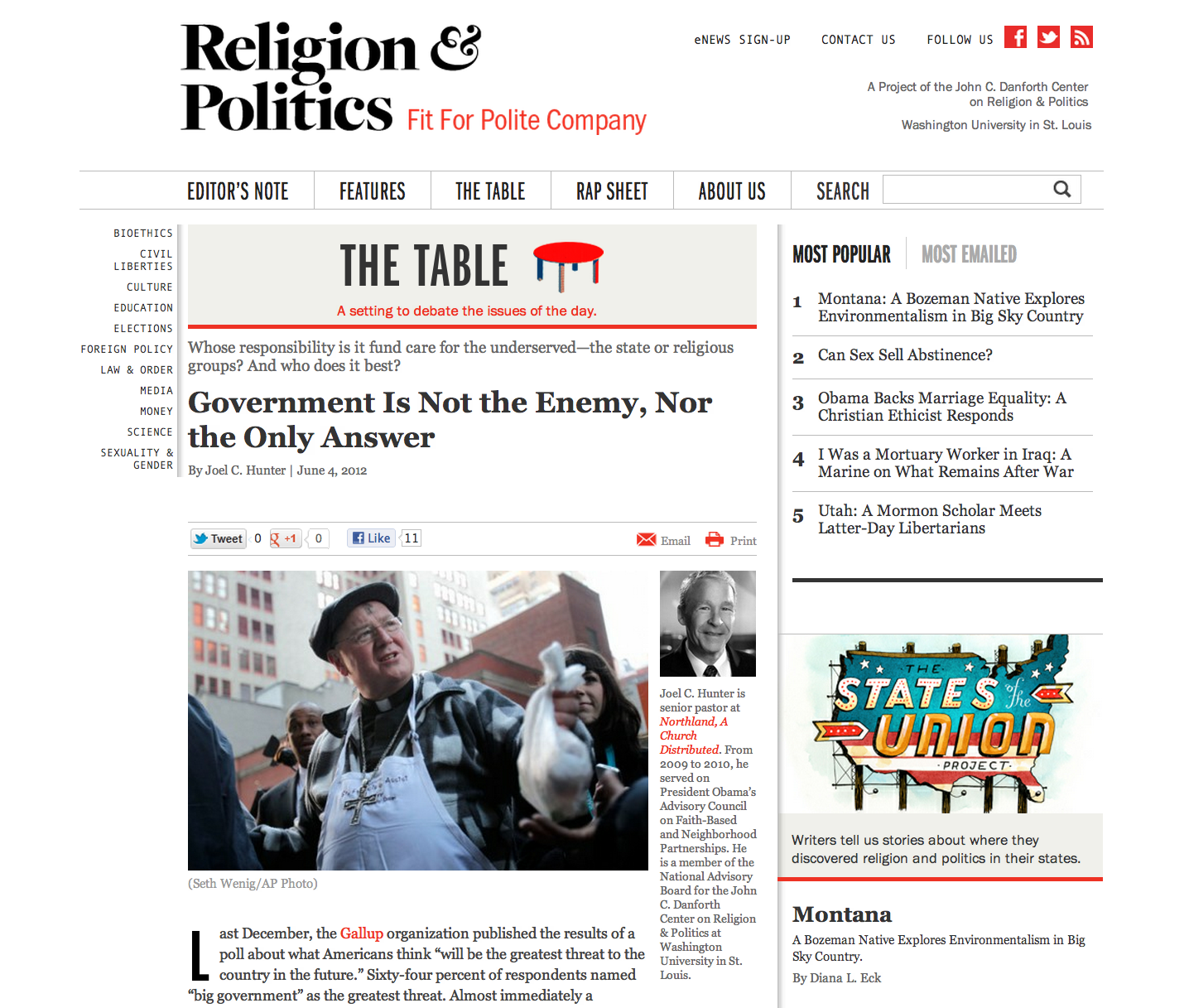Government Is Not the Enemy, Nor the Only Answer
 Last December, the Gallup organization published the results of a poll about what Americans think “will be the greatest threat to the country in the future.” Sixty-four percent of respondents named “big government” as the greatest threat. Almost immediately a conservative blogger declared, “It is official. Government is the enemy.” Commentary’s Peter Wehner read the numbers as “good news for conservatives.” “They re-confirm,” Wehner wrote, “that this remains a center-right nation, one instinctively committed to limited government and the free market.”
Last December, the Gallup organization published the results of a poll about what Americans think “will be the greatest threat to the country in the future.” Sixty-four percent of respondents named “big government” as the greatest threat. Almost immediately a conservative blogger declared, “It is official. Government is the enemy.” Commentary’s Peter Wehner read the numbers as “good news for conservatives.” “They re-confirm,” Wehner wrote, “that this remains a center-right nation, one instinctively committed to limited government and the free market.”
Vigilance about government overreach is always wise; it also has its dangers. The problem with jumping from a normal concern about government intrusion to a far-flung conclusion that all governmental growth is bad is that it falls short of logic, practical solutions, and, for Christians, the foundational place of government in God’s design.
A biblical overview stands in contrast to the simplistic but popular objectification of “the government.” Objectifying the government as beneath us is as intellectually lazy and dismissive as objectifying women or races. The government is people. And most of the people I have met who serve in governmental capacities are working hard to fulfill their responsibilities of office. We can argue whether their office is truly needed, but we cannot simply lump them all together as “the enemy.”
The beginning verses of Romans 13 summarize God’s design to use and shape governments. He always had believers involved with government as agitators or advisors. Some of the prophets in both the New Testament (John the Baptist and Paul) and the Old Testament (Jeremiah, Hosea, Amos) offered corrective rebukes to those in power. Others (Joseph, Nehemiah, Esther, Daniel) offered guidance inside the halls of power to both non-Hebrew-God believing leaders and to Hebrew-God believing leaders.
God has instituted government for our well-being. If government policy or leaders are bad, we are to oppose what we deem to be hurtful rather than helpful. But Romans 13:1-7 reveals that government is of God, government is a minister of God, and rulers are servants of God. Spiritually, government is not the enemy.
Logic also declares, “Government is not the enemy.” Jesus taught us that loving our neighbor involves practical help for those in need (Luke 10:30-37). The problems are too big for one faith community or even all faith communities combined to solve—extreme poverty, the ravages of climate change, the horrors of human trafficking, the financial bankruptcy of long-term medical conditions, et al. Logic would tell us that we must enlist various kinds of partners to help with a more comprehensive effort to effectively love our neighbor. Government funding is a necessary and welcome support for those who have no other effective safety net.
It is naive to believe that if the church was doing its job, the government would not have to be in the business of taking care of the needy. Would the church, or all religious institutions together, ever replace government aid? Practically speaking, and even faithfully believing, I say the answer is no.
A small church pastor, Chuck Warnock, summed it up quite nicely. He pointed out that according to figures from the Cato Institute and the Center on Policy and Budget Priorities, the average church would have to double its budget and funnel all its extra giving just to replace the government’s Supplemental Nutritional Assistance Program—aka SNAP (formerly called food stamps). What makes this idea surreal is that almost every church is struggling to meet its week-to-week expenses. And these figures do not even address the additional provisions of government assistance: transportation, job training/education health care, et al.
Our church in Longwood, Florida has experienced firsthand the value of partnering with government agencies. For example, last March, when 60 Minutes did a segment on the challenge of homeless school children in our own county, the show highlighted how the school board and local faith communities banded together to set up a food bank at every school in the county. School-church partnerships mean needy kids don’t go hungry on weekends or during breaks when they are away from reliable food sources at their schools. Additionally, in order to break the cycle of homelessness, churches can do what the school and government cannot. In our church we provide a caseworker, often trained with government funds, for each family that wants personal support to work towards financial independence.
In the traditional Christian understanding of government, government is not the enemy; neither is government the answer. Government is a possible partner in completing faith communities’ mission of loving and serving our neighbors in practical ways. In God’s economy, government agencies and faith communities cooperate to maximize what each can provide for the community. God uses governments to provide material support for the well-being of those in need. He uses faith communities to promote the well-doing of those struggling due to circumstances or choices. He intends the right mix of faith communities and government to create a healthier, more loving society.

